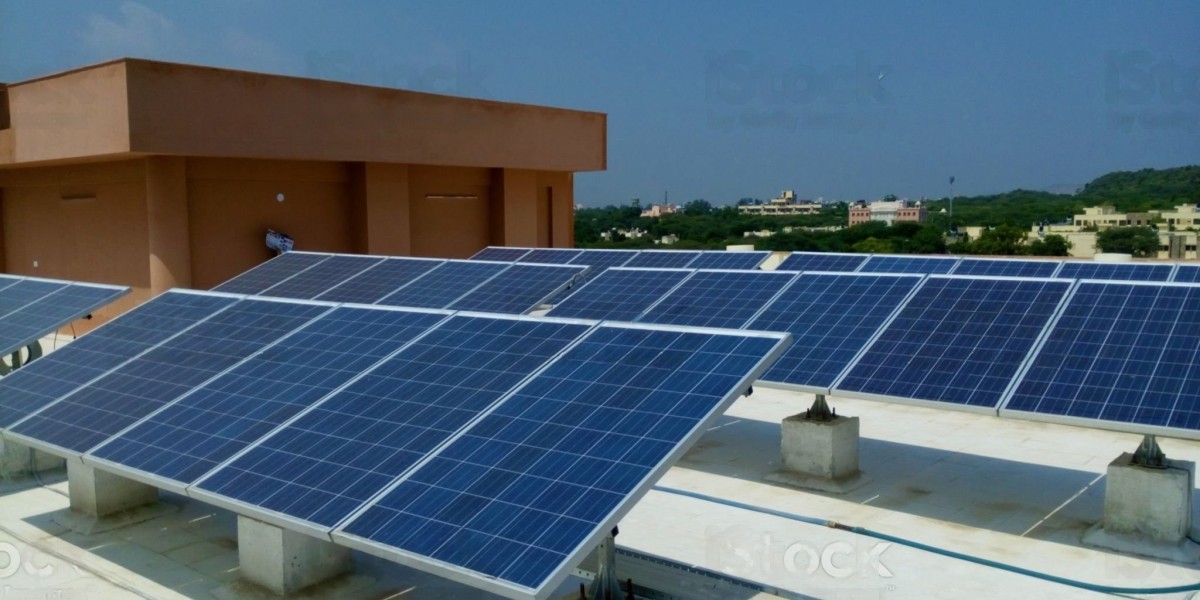Understanding Solar Rooftop Systems
Solar rooftop systems, also known as photovoltaic systems, convert sunlight into electricity using solar panels installed on rooftops or other elevated surfaces. These systems comprise solar panels, an inverter, and a mounting structure. When sunlight strikes the solar panels, the photovoltaic cells within them convert solar energy into direct current (DC) electricity.
How to do Solar Rooftop Systems Work?
Rooftop solar panels consist of multiple interconnected solar cells made from semiconductor materials. These cells absorb photons from the sunlight, which knock electrons loose from their atoms, generating electric current. The inverter then converts this DC electricity into alternating current (AC) electricity, suitable for powering household appliances and feeding excess electricity back into the grid.
Advantages of solar rooftop systems
- Clean and Renewable Energy: Solar energy is a clean and renewable source of power that reduces greenhouse gas emissions and dependence on non-renewable fossil fuels.
- Cost Savings: By generating their own electricity, homeowners can significantly reduce their monthly energy bills and even earn money by selling excess electricity to the grid.
- Long-Term Investment: Installing a solar rooftop system is a long-term investment that can provide a return on investment through energy savings and potential government incentives.
- Energy Independence: Solar rooftop systems offer homeowners the opportunity to become more energy-independent, reducing reliance on traditional energy sources.
- Environmental Benefits: Solar energy reduces the carbon footprint, air pollution, and water usage associated with traditional electricity generation.
Considerations for Installing a Solar Rooftop System
Before installing a solar rooftop system, several factors must be considered:
- Roof Suitability: Assessing the roof's structural integrity, orientation, slope, and shading is crucial to determine its suitability for solar panel installation.
- Available Space: Sufficient roof space is required to accommodate an adequate number of solar panels to meet the household's energy needs.
- Local Regulations: Familiarize yourself with local regulations, permits, and interconnection policies for grid-tied systems.
- Financial Considerations: Evaluate the upfront costs, potential return on investment, available incentives, and financing options for installing a solar rooftop system.
Step-Step Guide to Installing a Solar Rooftop System
- Energy Audit: Assess your energy consumption patterns and needs to determine the size and capacity of the solar rooftop system required.
- Choose a Qualified Installer: Select a reputable solar installation company with expertise in designing and installing solar rooftop systems.
- Design and Engineering: The installer will evaluate your roof's suitability, conduct a site survey, and design a customized solar system.
- Permitting and Approvals: Obtain the necessary permits and approvals from local authorities and utilities.
- System Installation: The solar panels, mounting structures, and inverters are installed by a professional installation team.
- Grid Connection: Connect the solar system to the electrical grid, ensuring compliance with local regulations and safety standards.
- System Commissioning: Test and verify the system's performance to ensure it functions optimally.
- Monitoring and Maintenance: Regularly monitor system performance and schedule maintenance to maximize efficiency and longevity.
Maintenance and Monitoring of Solar Rooftop Systems
To ensure optimal performance and longevity of a solar rooftop system, regular maintenance and monitoring are essential.
- Cleaning: Periodically clean the solar panels to remove dust, dirt, or debris that may hinder their efficiency.
- Inspection: Conduct routine inspections to identify and address any issues, such as loose connections or damage to panels or wiring.
- Performance Monitoring: Utilize monitoring software or systems to track solar energy production and performance.
- Professional Servicing: Engage professional technicians for periodic servicing, including electrical checks, inverter inspections, and system performance evaluations.
Financial Incentives for Solar Rooftop System Installation
Installing a solar rooftop system can be financially advantageous due to various incentives and programs.
- Solar Investment Tax Credit (ITC): Homeowners in certain countries can benefit from federal or state tax credits, providing a percentage deduction on the total installation cost.
- Feed-in Tariffs (FiTs): Some regions offer FiTs, where homeowners are paid for excess electricity they generate and feed back into the grid.
- Net Metering: Net metering allows homeowners to offset their electricity bills by exporting excess solar power to the grid and receiving credits for it.
- Grants and Rebates: Government agencies, local municipalities, or utility companies may offer grants or rebates to encourage solar system installations.
Environmental Impact of Solar Rooftop Systems
Solar rooftop systems play a vital role in reducing electricity generation's environmental impact:
- Reduced Carbon Emissions: Solar energy reduces greenhouse gas emissions, combating climate change and improving air quality.
- Water Conservation: Unlike traditional power generation methods, solar energy does not require significant water usage, reducing the strain on water resources.
- MINIMIZED COLLATION: Solar power generation produces no air or noise pollution, creating a cleaner and quieter environment.
- Preservation of Natural Resources: By relying on sunlight, solar energy reduces fossil fuels and preserves valuable natural resources.
Solar Rooftop Systems: A Sustainable Future
Solar rooftop systems offer a sustainable and efficient method of harnessing solar power. As technology advances and costs decrease, these systems are becoming increasingly accessible to homeowners and businesses alike. By adopting solar energy, we can pave the way for a greener future, reduce carbon emissions, and secure our energy independence.
Conclusion
Solar rooftop systems represent a transformative step towards a sustainable and eco-friendly future. By embracing solar power systems, we can reduce our carbon footprint, enjoy long-term cost savings, and contribute to a cleaner planet. With the numerous financial incentives available and the advancements in renewable energy technology, now is the ideal time to explore the benefits of installing a solar rooftop system.
 " class="wow_main_float_head_img">
" class="wow_main_float_head_img">







